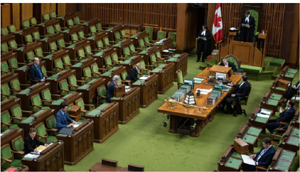
Saturday April 11, 2020 ~ NATIONAL
by Mary Brooke ~ West Shore Voice News
Early this morning April 11 (at 6 am Pacific Time), NDP leader Jagmeet Singh addressed media with a simple message for what Prime Minister Justin Trudeau should say to Canadians: “If you need help, apply now.” .
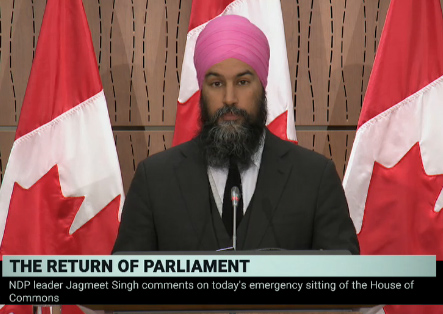
Singh was referring to how some qualifications for receiving Employment Insurance benefits (EI) and also the Canada Emergency Response Benefit (CERB) are preventing Canadians from receiving any support.
By the end of the day the NDP leader’s calls to improve access to the Canada Emergency Response Benefit (CERB) were ultimately adopted into law, including addressing the needs of seasonal workers, post-secondary students seeking summer employment, self-employed and gig economy workers, artists, and those who have exhausted their employment insurance benefits.
He said that the present setup of CERB was penalizing people who were “honest” and were finding the CERB application to be eliminating them if they hadn’t quite made $5,000 in the previous year or who had found themselves unemployed due to COVID-19 through no fault of their own.

Then Bloc Quebecois leader Yves-Francois Blanchet said the C-14 proposed legislation contained some good things for business, but also said that migrant workers incoming to Quebec also needed to be placed under 14-day quarantine.
By day’s end, the Canada Border Services Agency said that temporary foreign workers must self-isolate for 14 days before being able to come in contact with anyone in Canada and before they can start working.
Blanchet was pleased that “proper discussions have brought about solutions” in the House of Commons today.
What’s in the Bill:
And after that — still ahead of today’s sitting in the House — Conservative Leader Andrew Scheer offered several examples of where the Tories had called for tweaks to the billions of dollars in financial aid that had been unveiled in the last few weeks aimed at ensuring that no one falls through the cracks.
Among what all sides agreed to (ahead of the session), in both the 15-page bill and through a unanimous consent motion to fast-track it, was:
- Proposing once an employer is eligible based on one month’s revenue, they would automatically qualify for the next period and those going forward;
- Implementing unspecified measures “without delay to address gaps in the Canada Emergency Response Benefit (CERB), or other programs, existing or proposed” such as students, part-time workers, and essential workers; and
- Bringing in “in the short-term” further support measures for Canadian small- and medium-sized businesses, which will be partially non-refundable, with the aim of of keeping jobs and reducing debt related to fixed costs.
“Not only will this give businesses more certainty, it’s also better policy,” Scheer said adding that it is evidence of why parliamentary oversight is required right now.
Then at 9:15 am (Pacific Time) the House of Commons convened for a one-afternoon session to pass Bill C-14: “A second Act respecting certain measures in response to COVID-19” aka COVID-19 Emergency Response Act, No. 2, having to do with impacts upon (changes to) the Income Tax Act and Financial Administration Act.
The price tag for Bill C-14 is $73 billion dollars. The legislation is designed to help businesses by providing a 75% wage subsidy (up from a previous 10% approved in legislation passed on March 25). However, generally only large businesses are addressed with this measure: payroll must be at least $50,000 and there must be proof of revenue losses being 30% of what revenues were in the same months of the previous year (to qualify for March, losses can show as 15% less, since the pandemic and physical distancing kicked in mid-March).
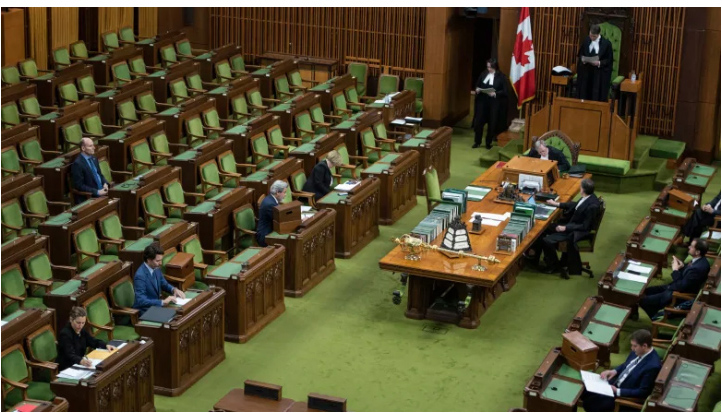
Parliament passed the legislation Saturday night after an emergency sitting that allowed Canadians to witness collaboration between parliamentarians from all parties.
With rapid-fire action, the legislation cleared both chambers of Parliament after days of protracted negotiations between the government and opposition parties (a first draft of Bill C-14 was released in-camera on Monday April 6). The advanced discussions allowed for agreement to pass the bill in one day. By 6:30 pm (Pacific), the bill had received royal assent from Governor General Julie Payette.
House Speaker Anthony Rota characterized the occasion as an “exceptional day in the midst of exceptional times.”

“The legislation introduced today includes additional flexibilities that would provide effective support to those eligible employers that are hardest hit by the COVID-19 pandemic and would help protect the jobs Canadians depend on during these difficult times,” it was stated on the federal Ministry of Finance website, with the purpose of the legislation summarized as “to help businesses keep Canadians in their jobs”.
The federal approach puts the onus on businesses to keep their fires burning during a pandemic which has already seen many companies closing their doors either temporarily or permanently. The wage subsidy boost from 10% to 75% legislated today has allowed some of the bigger and biggest companies to reconsider the layoffs since in March and early April and some rehiring has already taken place.
The support for business and employee re-hiring:
The Canada Emergency Wage Subsidy (CEWS) would apply at a rate of 75% of the first $58,700 earned by employees – representing a benefit of up to $847 per week, per employee. The program would be in place for a 12-week period, from March 15 to June 6, 2020. The government claims: “Employers of all sizes and across all sectors of the economy would be eligible, with certain exceptions including public sector entities. Flexibility in the measurement of revenue for the purpose of applying the revenue decline test would also ensure more consistent access to the wage subsidy across impacted organizations, including newly created businesses and high-growth companies, as well as non-profit organizations and registered charities.”
Finance Minister Bill Morneau said in a press briefing that the wage subsidy bill will make sure “that employers can keep their employees attached to their enterprise.” In that sense the bill is more than about money — it carries within it a gesture to see the socioeconomic structure of Canadian society maintain some measure of stability.
Today major companies in the hard-hit airline industry (including WestJet) announced they would rehire a significant number of employees, even though flights have been cut back at this time.
The Prime Minister’s address:
Prime Minister Justin Trudeau addressed Canadians from the House of Commons today, after doing his daily COVID-19 updates for a month from outside his official residence in Ottawa where he was self-isolating after his wife Sophie had tested positive with COVID-19 on March 12.
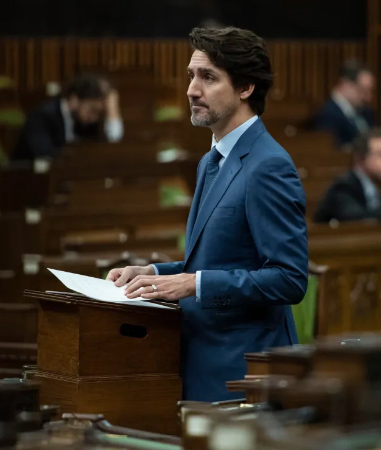
“Without reservation, without pause, we must fight for every inch of ground against this disease. We must be there for one another as we spare no effort to safeguard our collective future,” Trudeau said in the context of likening the current situation to a war.
Unlike wars of the past century where a front line would be marked with barbed wire, Trudeau said the front line of the COVID-19 pandemic is everywhere — in homes, hospitals and grocery stores.
Another difference is that in previous ‘conventional’ wars, soldiers signed up for duty (or were conscripted) but they were seen as a distinct and identified body of resistance. In the case of COVID-19, in the blink of an eye everyday workers in stores and services like trucking as well as health care workers have found themselves on the multiple front lines of the fight against an unseen virus. And each one of us as we shop for groceries is out on the front line.
But in actual fact we are all on the front line as the virus is virtually everywhere. It spreads by way of droplets between people within a distance of six feet, and can survive on surfaces like cloth, metal and plastic, sometimes for days. Hence the need for physical distancing, hand washing, and self-isolation.
Seniors are among the most threatened, said Trudeau in his speech today. This is based on the science that most of the deaths from COVID-19 are seen in people age 60 and older (though that is based on the reality that most older persons would have less robust immune systems); others who are immune-challenged or have underlying health conditions are also prime targets for the COVID-19 viral infection.
During questions (committee of the whole format) after the speeches, Trudeau acknowledged the “incredible collaboration” that has been provided by the NDP toward the government ensuring to all Canadians that everyone who needs help will get help.
Conservative Leader Andrew Scheer and his party did not stand in the way of the legislation being processed promptly. But he said his party’s support was conditional on the government agreeing to more accountability measures. Specifically, the Conservatives (as Official Opposition) want more parliamentary committees to meet throughout this pandemic. One of those committees will be tasked with studying whether Parliament can meet virtually in the weeks ahead.
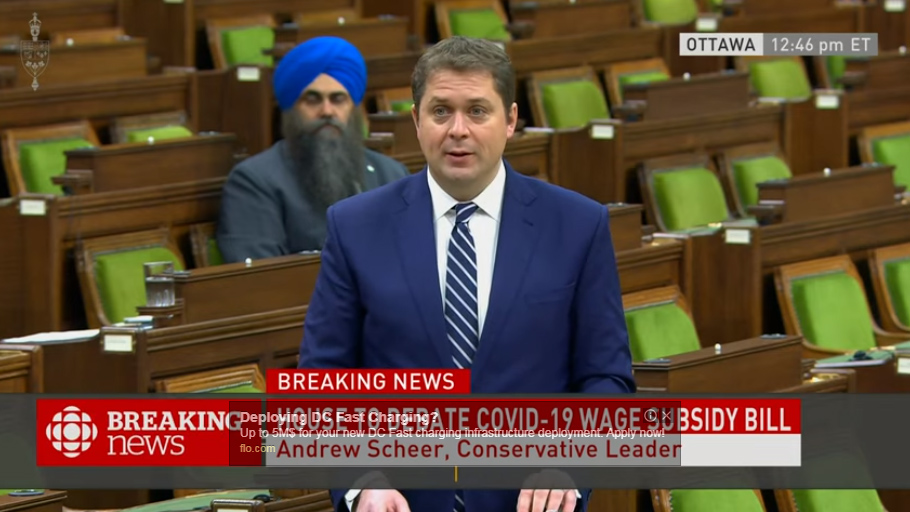
“The prime minister said we need to prepare for a second and perhaps a third wave,” said Scheer. “Canadians want to know how this government is preparing to get ahead of those waves,” he said in a speech to the Commons today. “Parliament has a vital role to play now. Through debate and discussion and regular questions from the opposition, we will get better results for Canadians.”
Scheer gave some practical examples of adjustments and considerations that will help small businesses qualify for financial support, such as showing a loss of subscription or product orders.
History may find it ironic that Canada ended up with a minority government just ahead of this pandemic, and that the Conservative leader whose own party wanted to oust him for ‘poor election results’ is actually stabilizing the parliamentary ship during a time of crisis.
In the House of Commons Scheer struck a positive note including a rallying cry for cooperative support: ‘This is the job of Team Canada’. Full transcript of Scheer’s speech April 11 in the House of Commons.
This time in history:

An Easter weekend notation was made by Scheer at the beginning of his remarks in the House of Commons today: “It is perhaps very fitting that we are meeting here on this day, Holy Saturday. The day between the sadness of Good Friday, the day Christ suffered and died for our sins and Easter Sunday, the day he rose and conquered death.”
“The voters are always right” is the adage espoused by politicians, especially when they lose an election. But with a historical lens, once again we will see that this minority government under Justin Trudeau’s Liberal leadership has brought the sweeping desire to take charge, softened and redirected a bit in terms of policy delivery by the society-wide policy leanings of the NDP, the practicalities (though sometimes narrow) of the Conservatives (and the not inappropriate remarks by Scheer about the timing of today’s session being on Holy Saturday), and the sense of conscience that Bloc Quebecois Leader Yves-Francois Blanchet brings so articulately to the mix.
Green Party Parliamentary Leader Elizabeth May (MP for Saanich and the Gulf Islands and former party leader 2006 to 2019) travelled from Vancouver Island to be part of this historic passage of Bill C-14 today in Ottawa.
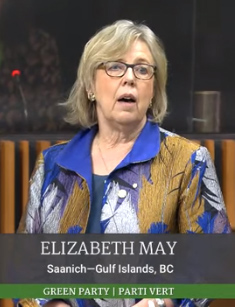
She said she was moved by Trudeau’s remarks about the anniversary of Vimy Ridge (the battle on April 9, 1917 during World War II in which many Canadian soldiers were killed or wounded), and noted that many people today are still affected by those wars through the impact on families and the stories told.
“We are here together in a way that I want to acknowledge with deep gratitude is Parliament working well even when we are at a distance,” said May in her 11-minute 58-second speech.
“This must not be a moment that divides us,” May said in her remarks in the House of Commons today. Transcript & video of Green Party Parliamentary Leader Elizabeth May in the House of Commons April 11, 2020
“We must remember, and work differently in future,” said May with the hope that the parliamentary process will be more collaborative in future.
It might be said that this Green party mission statement was seen alive and well today: “The Green Party isn’t like any other political party. Our mission is to rescue grassroots democracy from the political spin that makes voters recoil. Our goal is to make sure the planet and our communities survive and thrive.”
May said that the Green Party will continue to work to see a Guaranteed Livable Income in Canada: “We will still fight for that.”. The CERB program of the federal government during COVID-19 is perhaps an example to show Canadians what that looks or feels like, with the supports provided as needed to Canadians during this crisis.
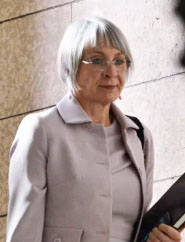
Revealing some inside politics:
However, call it political mud-slinging, but the Conservatives did unearth and bring light today to some government briefing notes (tabled with the health committee Wednesday), showing a Liberal bureaucracy reluctant to put inbound travellers or business people returning to Canada from China into mandatory quarantine or to close borders to arrivals from other hot spots.
It was shown today that federal public health officials advised Health Minister Patty Hajdu as late as March 10 that the risk of COVID-19 to Canada was “low.” A week later, the prime minister ordered a shutdown of social and economic life. Hajdu herself seems to have over the last few months chaffing at the tethers on her voice; she has been a good team player but has revealed by temperament or tone a bit more truth at important moments.
The China File:
History, again, may question Trudeau’s persistent desire to please China and the powerful Chinese financial community that has built a strong presence in Canada since the mid 1980s. And meanwhile Trudeau has been squeezed by the unpredictable power moves of US President Donald Trump with regard to China.
The Canadian government’s handling of Huawei-related politics also reveals what seems like a fascination with China while at the same time being a careful necessity — regarding (both the detaining of Huawei executive Meng Wanzhou — which includes the component of two Canadians jailed in China in response at the same time, and also G-5 network issues as would allegedly impact Canadians’ privacy.
In this context, Canadians can feel relieved that the World Health Organization did its best to placate and give respect to China for how they handled the release of useful information about the novel coronavirus in January through to mid-March before the virus was dubbed COVID-19 and before a pandemic was officially declared. This does, however, give China further political leverage in the months and years ahead. Evidence of that already is seen in how some shipments of PPE to Canada were recently held up by China.
======== COVID-19 ARTICLES by West Shore Voice News
Search for COVID-19 in the search field at the top of this page.



